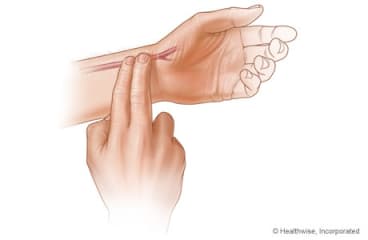
Overview
A heart rhythm problem, or arrhythmia, is a change in the normal rhythm of your heart. Your heart may beat too fast or too slow or beat with an irregular or skipping rhythm. A change in the heart's rhythm may feel like a really strong heartbeat or a fluttering in your chest. A severe heart rhythm problem can keep the body from getting the blood it needs. This can cause shortness of breath, lightheadedness, and fainting. A heart rhythm problem can make your heart failure worse and increase your chance of dying suddenly.
You may take medicine to treat your condition. Your doctor may recommend a pacemaker, an implantable cardioverter-defibrillator (ICD), or a procedure called catheter ablation to destroy small parts of the heart that are causing a rhythm problem.
Follow-up care is a key part of your treatment and safety. Be sure to make and go to all appointments, and call your doctor if you are having problems. It's also a good idea to know your test results and keep a list of the medicines you take.
How can you care for yourself at home?
- Take your medicines exactly as prescribed. Talk to your doctor if you have any problems with your medicines.
- If you received a pacemaker or an implantable cardioverter-defibrillator (ICD), you will get a fact sheet about it.
- Wear a medical alert ID bracelet. You can buy one at most drugstores or order it online.
- Make sure you go to your follow-up appointments.
- If your doctor has not set you up with a cardiac rehabilitation (rehab) program, ask if it is right for you. Cardiac rehab includes exercise, help with a heart-healthy lifestyle, and emotional support.
- Check your pulse daily. Place two fingers on the artery at the palm side of your wrist, below your thumb. If your heartbeat seems uneven, talk to your doctor.
Have a heart-healthy lifestyle
- Do not smoke.
- Eat a heart-healthy diet.
- Be active. Do not start to exercise until you and your doctor have made an activity plan that is safe for you.
- Limit or avoid alcohol.
- Stay at a healthy weight. Lose weight if you need to.
- If you think you might have a problem with alcohol or drug use, talk to your doctor.
- Ask your doctor whether you can take over-the-counter medicines (such as decongestants). These can make your heart beat fast.
When should you call for help?
Call 911 anytime you think you may need emergency care. For example, call if:
- You have symptoms of sudden heart failure, such as:
- Severe trouble breathing.
- Coughing up pink, foamy mucus.
- A new irregular or rapid heartbeat.
- You have symptoms of a heart attack. These may include:
- Chest pain or pressure, or a strange feeling in the chest.
- Sweating.
- Shortness of breath.
- Nausea or vomiting.
- Pain, pressure, or a strange feeling in the back, neck, jaw, or upper belly or in one or both shoulders or arms.
- Lightheadedness or sudden weakness.
- A fast or irregular heartbeat.
After you call 911, the operator may tell you to chew 1 adult-strength or 2 to 4 low-dose aspirin. Wait for an ambulance. Do not try to drive yourself.
Call your doctor now or seek immediate medical care if:
- You have new or increased shortness of breath.
- You are dizzy or lightheaded, or you feel like you may faint.
- You have sudden weight gain, such as more than 2 to 3 pounds in a day or 5 pounds in a week. (Your doctor may suggest a different range of weight gain.)
- You have increased swelling in your legs, ankles, or feet.
- You are suddenly so tired or weak that you cannot do your usual activities.
Watch closely for changes in your health, and be sure to contact your doctor if you develop new symptoms.
Where can you learn more?
Go to http://www.healthwise.net/patientEd
Enter S753 in the search box to learn more about "Heart Rhythm Problems in Heart Failure: Care Instructions".
Current as of: July 31, 2024
Author: Ignite Healthwise, LLC Staff
Clinical Review Board
All Healthwise education is reviewed by a team that includes physicians, nurses, advanced practitioners, registered dieticians, and other healthcare professionals.

